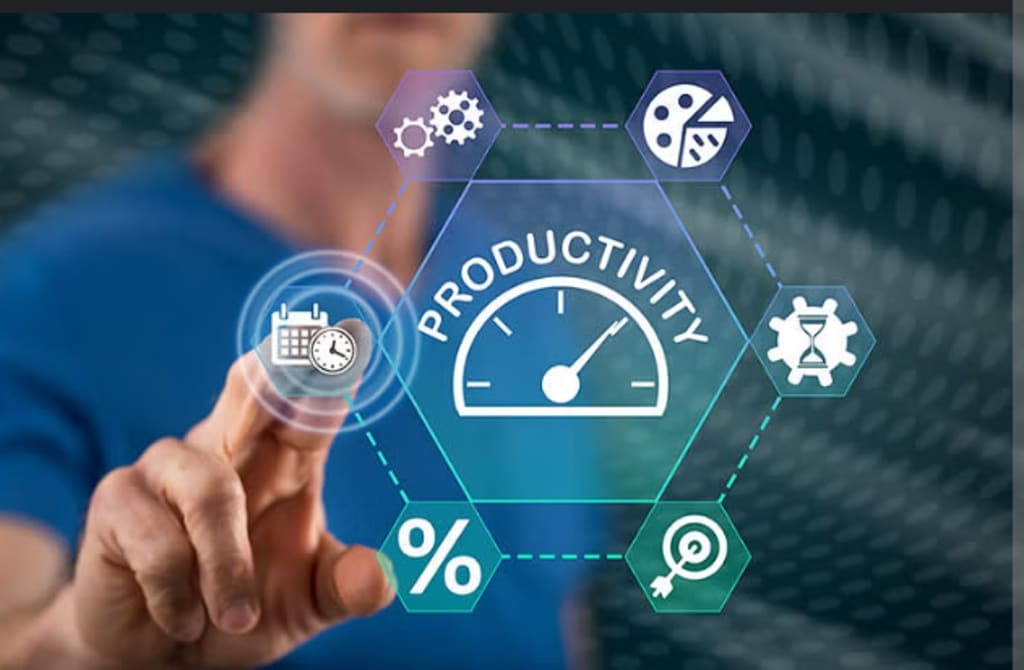10 proven strategies to improve your productivity
10 𝑷𝒓𝒐𝒗𝒆𝒏 𝒔𝒕𝒓𝒂𝒕𝒆𝒈𝒊𝒆𝒔 𝒕𝒐 𝒊𝒎𝒑𝒓𝒐𝒗𝒆 𝒚𝒐𝒖𝒓 𝒑𝒓𝒐𝒅𝒖𝒄𝒕𝒊𝒗𝒊𝒕𝒚

Sure, here are 10 proven strategies to improve your productivity:
1. Set clear goals and priorities: Setting clear goals and priorities is an essential step in improving productivity. When you have a clear understanding of what you need to accomplish and in what order, you can focus your time and energy on the most important tasks. This allows you to work more efficiently, make better use of your time, and achieve your goals more quickly. Clear goals also help to increase motivation and provide a sense of direction, which helps to reduce stress and prevent burnout. To set clear goals and priorities, it's important to write down your goals, make a to-do list, use the SMART method, be flexible, stay focused, and regularly review and adjust your goals and priorities as needed.
2. Eliminate distractions: Eliminating distractions is a key factor in improving productivity. Distractions such as social media, email, or phone notifications can disrupt your focus and make it difficult to complete tasks efficiently. To eliminate distractions, it's important to create a distraction-free work environment by turning off notifications, closing unnecessary browser tabs, and putting away any distracting devices. Another way to reduce distractions is to set specific times to check emails or messages instead of constantly interrupting your work. Taking regular breaks can also help you stay focused and avoid burnout. By minimizing distractions, you can improve your concentration, work more efficiently, and achieve your goals more quickly.
3. Take regular breaks: Taking regular breaks is an important strategy for improving productivity. While it may seem counterintuitive, taking short breaks throughout the day can actually help you work more efficiently and effectively. This is because taking breaks allows you to recharge and refocus, which helps to reduce stress and prevent burnout. In addition, regular breaks can help to improve your overall well-being by reducing the physical strain of prolonged sitting and computer use. To take regular breaks, it's important to schedule them into your workday and set specific times for breaks. During breaks, engage in activities that relax your mind and body, such as stretching, walking, or meditation. By taking regular breaks, you can boost your productivity and achieve your goals more efficiently.
4. Use the Pomodoro technique: The Pomodoro technique is a time management method that involves breaking down work into intervals of typically 25 minutes, known as "Pomodoros," separated by short breaks. This technique can be effective for improving productivity and focus by providing a structured way to work efficiently. By dividing work into shorter intervals, the Pomodoro technique helps to reduce the feeling of overwhelm that can come with longer work periods, allowing you to stay focused and work more efficiently. The short breaks in between Pomodoros provide a chance to recharge and refocus, which can help to prevent burnout and improve overall well-being. To use the Pomodoro technique, set a timer for 25 minutes and work on a single task until the timer goes off. Take a 5-minute break, then start another Pomodoro. After four Pomodoros, take a longer break of 15-30 minutes. By using the Pomodoro technique, you can stay focused, work more efficiently, and achieve your goals more quickly.
5. Delegate tasks: Delegating tasks is an important strategy for improving productivity, especially when working as part of a team. By delegating tasks, you can make better use of your time and skills, while also helping others to develop their own skills and take on greater responsibility. To delegate effectively, it's important to identify tasks that can be delegated and to assign them to the appropriate person based on their skills and experience. Provide clear instructions and expectations, and be available to answer questions and provide support as needed. Delegating tasks not only helps to increase productivity, but also fosters a sense of teamwork and collaboration. It allows everyone to focus on their strengths, while also supporting the overall success of the team or organization. By delegating tasks effectively, you can work more efficiently, achieve your goals more quickly, and foster a positive and productive work environment.
6. Set deadlines: Setting deadlines is a key strategy for improving productivity. When you have a clear deadline for a task, you are more likely to stay focused and work efficiently to complete it on time. Deadlines also help to prioritize tasks and make it easier to manage your workload. To set effective deadlines, it's important to consider the scope and complexity of the task, as well as your own abilities and other commitments. Break down larger tasks into smaller, more manageable steps, and set deadlines for each step along the way. Use tools such as calendars or task management software to help you stay organized and on track. By setting deadlines and sticking to them, you can work more efficiently, avoid procrastination, and achieve your goals more quickly.
7. Prioritize self-care: Prioritizing self-care is an important strategy for improving productivity. When you take care of your physical and mental health, you are better able to focus, manage stress, and work more efficiently. Self-care activities can include exercise, proper nutrition, getting enough sleep, and taking breaks throughout the day. It's also important to engage in activities that help you relax and recharge, such as reading, listening to music, or spending time with loved ones. By prioritizing self-care, you can reduce the risk of burnout, increase motivation, and improve overall well-being. Remember, taking care of yourself is not selfish - it's essential for your productivity and success. So make time for self-care activities as part of your daily routine, and watch as your productivity and effectiveness improve.
8. Automate repetitive tasks: Automating repetitive tasks is a strategy for improving productivity by reducing the time and effort required for routine tasks. Repetitive tasks such as data entry, email management, or social media posting can take up a significant amount of time that could be better spent on more important tasks. By automating these tasks, you can free up your time and focus on higher-priority work. There are various tools and software available to automate repetitive tasks, such as scheduling software, email filters, or chatbots. Before automating a task, it's important to carefully consider whether it is appropriate and effective to do so. It's also important to regularly review and update your automation processes to ensure that they are still meeting your needs and goals. By automating repetitive tasks, you can work more efficiently, reduce errors, and achieve your goals more quickly.
9. Learn to say no: Learning to say no is a strategy for improving productivity by avoiding over-commitment and setting appropriate boundaries. It can be tempting to say yes to every request or opportunity that comes your way, but this can lead to taking on too much work and becoming overwhelmed. Learning to say no allows you to prioritize your own goals and needs, and focus on tasks that are most important and meaningful to you. When saying no, it's important to do so respectfully and tactfully, while still being clear and firm in your decision. Consider offering alternative solutions or suggesting other resources that may be able to help. By learning to say no, you can work more efficiently, reduce stress and burnout, and achieve your goals more effectively. Remember, it's okay to prioritize your own needs and goals - saying no is an important part of setting healthy boundaries and taking control of your workload.
10. Continuously learn and improve: Continuously learning and improving is a strategy for improving productivity by staying up-to-date with the latest trends, tools, and techniques in your field. By regularly seeking out new knowledge and skills, you can improve your ability to work efficiently and effectively, while also keeping up with the demands of your job or industry. Continuously learning can take many forms, such as taking courses or attending conferences, reading industry publications, or seeking out mentorship or coaching. It's important to make a commitment to lifelong learning and to set goals for your personal and professional development. By continuously learning and improving, you can increase your confidence, expand your network, and open up new opportunities for growth and success. Remember, learning is a continuous process, and the more you invest in yourself, the more you'll be able to achieve in your career and beyond.
In conclusion, improving your productivity takes time and effort, but using these ten strategies can help you stay focused, motivated, and achieve your goals.
About the Creator
Enjoyed the story? Support the Creator.
Subscribe for free to receive all their stories in your feed. You could also pledge your support or give them a one-off tip, letting them know you appreciate their work.
Reader insights
Outstanding
Excellent work. Looking forward to reading more!
Top insights
Compelling and original writing
Creative use of language & vocab
Easy to read and follow
Well-structured & engaging content
Excellent storytelling
Original narrative & well developed characters
Expert insights and opinions
Arguments were carefully researched and presented
Eye opening
Niche topic & fresh perspectives
Heartfelt and relatable
The story invoked strong personal emotions
Masterful proofreading
Zero grammar & spelling mistakes
On-point and relevant
Writing reflected the title & theme





Comments (1)
Keep it up. Nice work.